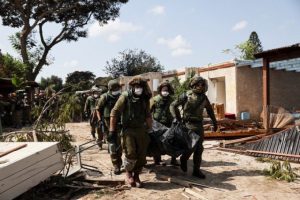Simon Louagie dreaded losing Talbot House, a World War I soldiers’ club that has become an institution in remembrance tourism on the Western Front where soldiers from all corners of the globe fought amid untold carnage just over a century ago.
For months last year, a COVID-19 lockdown closed the club which had always been an open house. Once it was for Commonwealth soldiers who fleetingly shed the fear of battle in Flanders fields that were within earshot.
For generations since, people found history, solace, wisdom and an understanding at Talbot House about why the motto of this region in western Belgium is “Never into war again.”
Also read: No longer mandatory for government employees to travel via Air India
Since the end of World War I in 1918, millions of visitors — from as far away as the United States, New Zealand, and South Africa — have flocked to memorials in northern France and Belgium to pay tribute to the fallen.
Now, closing in on two years of the coronavirus pandemic and travel restrictions, the tourist industry welcoming them is crippled. Lockdowns and travel restrictions, of which many remain in place, are keeping foreign visitors away.
Also read: UN says 3 million people in need of life-saving assistance in Myanmar
Another Armistice Day beckons on November 11 and the outlook remains bleak.
Talbot House manager Louagie remembers that when funds were running low and doors were closed, only one thought ran through his head: “Not on my watch.” From as many as 500 guests a day, he sometimes found himself alone.
The house, he said, “needs noise. It needs piano music. It needs visitors, schoolchildren, and people playing chess. Cups of tea, rattling in the kitchen to make it come alive. I need to hear the kettle whistle,” he said.
Also read: Taliban run background checks within ranks to ‘find and eliminate’ IS members
“We cannot disappoint all those generations before us by letting it close down,” he said. The thought has echoed around the region where hundreds of thousands lost their lives during the four years of fighting which finally led to the victory of allied forces over Germany.
Nick Benoot, who runs the small Hooge Crater Museum not far from Poperinge could not believe it when at the end of 2019, schools started to cancel trips because of reports of a virus in Wuhan, China.
Like Louagie, he had plunged money into the business and needed any income he could get. “Seriously, do you mean that? This is in China. This is far, far away from us,” he remembers saying. But the reality of the pandemic, which has since claimed at least 5 million dead across the globe, soon sank in and he had to close on March 13, 2020 – a somber day he remembers well.
Also read: Dubai’s Jebel Ali Village will be demolished to make way for luxury villas
From 65,000 paying visitors in 2017 to just 3,000 last year, the numbers demonstrated how remembrance tourism slumped throughout the region.
“It was like we went bankrupt. We had to close everything down,” he said.
But each man dealt with it in his own way and is still around to tell his story.
Crowdfunding was the answer for Louagie. Last year, a 98-year-old World War II veteran raised money by walking from a war graves cemetery to Talbot House, cheered on by locals who pulled money out of their wallet when they were not applauding. When a local died, the family asked that instead of flowers, mourners donate money to Talbot House.






